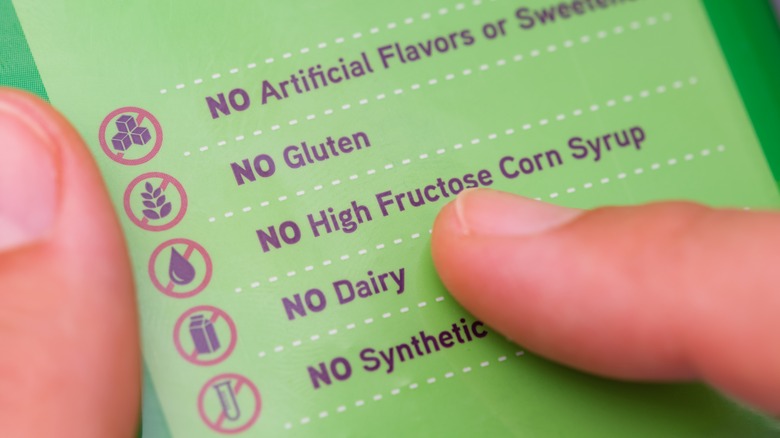The Ingredient In Store-Bought Pasta Sauce That Can Raise Your Bad Cholesterol
Pasta sauce is like peanut butter — an average household would probably have a jar. When you can't be bothered to spend time slicing fresh tomatoes to purée and add to your pasta, soups, and pizzas, pasta sauces are instant flavor elevators and thickeners we turn to out of convenience.
But perhaps, you're better off slicing those tomatoes instead. Common store-bought pasta sauce brands contain an ingredient that's quite concerning, to say the least. High-fructose corn syrup, more simply referred to as HFCS, adds sweetness, albeit cheaply, to many processed foods and drinks in the market, and pasta sauces aren't an exception. You might find them in other sauces, mayonnaise, salad dressings, carbonated beverages, and many more packaged goods.
The ingredient, which has been an additive in various foods since its invention in 1957, has caused quite a stir in medical communities, one reason being its negative effect on cholesterol levels. For example, a 2011 study published in The Journal of Clinical Endocrinology & Metabolism, found that adults who consumed high fructose corn syrup for two weeks as 25% of their daily calorie intake, showed an increase in low-density lipoprotein, or LDL, cholesterol (otherwise known as "bad" cholesterol), triglycerides, and apolipoprotein-B. Apolipoprotein-B is a protein that attaches to bad cholesterol in your system and contributes to plaque buildup in blood vessels. Something to think about for people with high cholesterol, and otherwise.
High-fructose corn syrup and cholesterol
High-fructose corn syrup, which is an artificial sugar made from corn syrup, is not very different from regular table sugar in its makeup, although the former typically contains a higher percentage of fructose when compared to glucose — sometimes as much as 55%.
While all types of sugar consumed in excess are bad for you, the problem with fructose lies in the way it's converted into energy. With glucose, your body is able to more readily use the sugar as an energy source, but with fructose, your liver is involved in the conversion process, and this is where cholesterol-related problems arise. When fructose is turned into glucose, glycogen, or fat by your liver, before becoming viable as an energy source, it "starts a fat production factory," explained functional medicine physician Dr. Mark Hyman (via Cleveland Clinic). "It triggers the production of triglycerides and cholesterol." A 2017 study done on mice and published in Acta Scientiarum Polonorum Technologia Alimentaria found adverse blood lipid parameters, weight gain, and peri-organ fat deposits with HFCS consumption.
Your cholesterol levels mean more than you think. While your total serum cholesterol is a number doctors will look at, there are also other particulars as we mentioned before: LDL cholesterol, high-density lipoprotein cholesterol (sometimes referred to as "good" cholesterol or HDL), and triglycerides (a type of fat circulating in your blood). When you have high cholesterol, your LDL and triglyceride levels are high, while your HDL is low. The opposite is true for healthy cholesterol levels.
Consuming high-fructose corn syrup
Some experts think it's impossible to completely avoid HFCS as it's part of more foods out there than you can count. The key, however, is to understand the dangers of too much fructose and how it could impact your cholesterol levels. Over time, chronic consumption of HFCS could lead to an increased risk of fatty liver disease, obesity, weight gain, diabetes, and gut-related problems.
The clinical nutrition manager at the Hospital of Central Connecticut in New Britain, Jennifer Feda (via Hartford HealthCare), explained that limiting consumption might be the way to go, just like with all other types of added sugars. "Even a small change like not drinking regular soda is beneficial. Limiting processed foods in general will not only help you limit intake of high fructose corn syrup, but also your intake of unhealthy fats, which is a bonus," added the expert.
As for your store-bought pasta sauces, you can seek out healthier brands that avoid the use of HFCS or make the stuff at home. You'll need ingredients like olive oil, onions, garlic, tomatoes, carrots, seasoning, and fresh herbs. Sugar can come disguised in different forms, so it's important to become aware of the ingredients on labels and avoid anything that you're unfamiliar with.
With all this talk about fructose, perhaps you're wondering about fruits since fructose makes up half of the sugars in fruits as well. The added benefit of fruits, however, is that they contain other beneficial nutrients like fiber, vitamins, and minerals. Also, it's not likely that you over-consume them the way you might with HFCS, which offers no essential nutrients.



